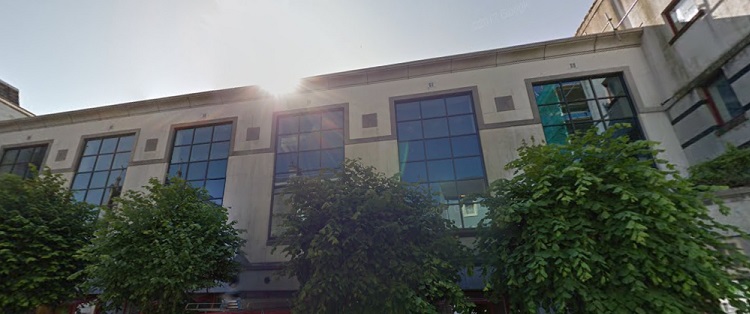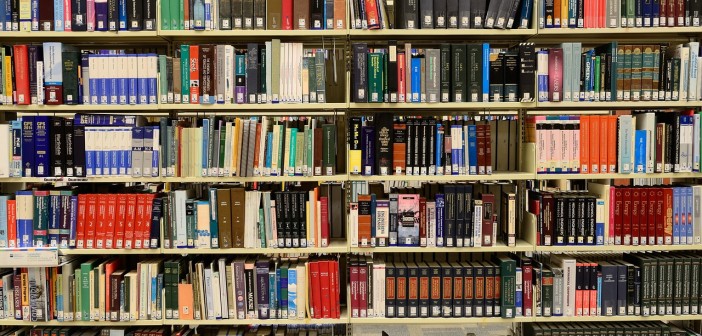Out Here | 9 | The Noisy Silence of Galway City Library
All sound is amplified in Galway City Library. As if the quiet italicises every small noise: The growl of my stomach, someone’s soft footfalls, the rustle of pages and scratch of pens. Outside the world turns. Its freeways are jammed, its air is polluted and people talk shit. But in here, among the books, I can just sit. Surrounded by the murders, romances and ideas that fill this wide room’s shelves.
College students sit hunched over assignments. With the faint drumbeats from their headphones tickling the airwaves. The librarians organise their workplace. A homeless man is asleep in a chair and a young mother balances a toddler on her knee. Keeping him quiet with a story. I sit at a desk that faces the floor to ceiling windows, looking out onto the street. The fiction section stands behind me. And tucked away in the corner to my right are the biographies of musicians and athletes and business moguls and politicians. On all these shelves are the stories that helped shape mankind. The fictions and true tales of the world. Put there for anyone to read and learn from.
I get up and walk down the length of a shelf, looking for nothing in particular. Rain starts to tap at the windows. And the toddler begins to cry as his mother closes the book. She walks up to the desk and checks it out and when she puts it in her son’s hands the tears stop and he looks at the cover. Like he cannot believe he can bring it home with him.

They go out into the rain. I pull a book from the shelf, open it to the title page. Written there in old typewriter font is The Essential Lenny Bruce: His Original Unexpurgated Satirical Routines , the finest from a man who revolutionised comedy with his fiery, acidic humour. I bring it back to the desk, start reading. And proceed to laugh with a hand over my mouth until I feel my core muscles seize up while the student two desks over looks at me like I’ve sprouted another limb. But I keep laughing at all the demons that Bruce exorcised through his comedy. The religions and institutions and ideals that he shredded with his words.
The greats – George Carlin, Frank Zappa – understood the power of language. And that to put restraints on it is to obstruct the flow of human expression. Wrapping hands around our throats before we can even begin to speak. And calling it “protection.”
Censorship – the suppression of creativity because of its “indecency,” and in the name of “protection” – keeps humanity tethered to its fear. When an idea cannot be creatively expressed it takes on the power of taboo. And once it has been put up on that pedestal, it casts a long shadow over us. Becoming a great shame that stunts our growth. So that instead of growing up we step in line.
If our language can be controlled then so can we. The movement of information and ideas is central to our progression. And when that movement is harnessed the direction of our world is in the hands of whoever holds the reins. Then we can be steered down any path: onto the assembly line, to the warfronts, put behind a desk. And if our language has been taken from us, we won’t even be able to question it.
I read the transcript of Bruce’s routine “Religions Inc.” And I have to bite my tongue to keep the laughter from flying and breaking the library’s silence. The student working beside me has gone to wander the shelves. Looking for whatever she needs to earn her degree. I stop reading, try to catch my breath. Marvelling at how Bruce’s comedy stripped emperors of their clothes. Revealing them to be no more than any of us.

I let out a deep breath and turn back to the book. Realising that we take our languages for granted. The rain picks up strength and taps a manic beat on the windows. Out the corner of my eye I see the student come back with the books she had gone to find. She opens the first and leans into the pages. Wearing a frown of concentration.
Language made our growth possible. It is what built that student’s university and crafted the texts that she is studying. Without it we would still be dragging our knuckles. And our cathedrals and medicines and paintings and cities would never have been. In a library you are surrounded by language in all its forms – poetry, curses, thoughts and inventions and energies. Charles Bukowski wrote in Ham On Rye that “words weren’t dull, words were things that could make your mind hum.” And libraries, beneath their cloaks of stillness, spark and buzz with the energy of words. Their vitality is almost tangible. Where a quiet schoolroom feels dead there is potential in a library. A promise that education sucks out of our classrooms.
They are not centres of learning but hubs of indoctrination. There we are taught to fear teachers and bosses and gods as if they had powers beyond the ones we give them. In school I did not learn to strive. I learned that I would always be beneath those powers. And that my achievements were only worthwhile if they fit into their values that I did not believe in. So I stopped trying. Until I realised that the world was bigger than my classroom. And that its greatest accomplishments, the ones that moved me, end up in libraries. Where I can walk in and see what this planet is truly made of.
Our greatest accomplishments are kept here where anyone can get them. Libraries are houses of achievements that are not only outside of those institutional values, but that terrify the powers that set them. Their books and albums hold some of mankind’s finest work – Vonnegut’s novels, John Coltrane’s music, Stoner, the newspapers. These accomplishments pack the air in a library. So that it feels like the walls will split with the pressure of the patrons’ respect and silence.
It’s respect for the work and for each other. Everyone has come here to enrich themselves. To find something that will help them earn a PhD or pass an exam or chip away at these spring evenings. And nobody is going to get in anyone else’s way as they search. Even if they are not looking for anything in particular they are still looking for something. And they will know it when they see it.

The rain is heavy now. And the wind has started to howl down the city’s narrow streets. I look up from the book and see a walker hurrying to get out of the weather and someone flip the open/closed sign in the café across the road. It’s 6:00PM on a Saturday. The library closes at 8:00PM. That homeless guy has just woken up and staggered out the library’s door. He’ll have to tough the night out curled up in a shop doorway somewhere. Lying on our welcome mats because he is not welcome inside.
A library is a place where anyone is welcome. Provided they do not disturb anyone else. There is no coffee shop anywhere that will let a homeless man – dressed in stained clothes and stinking – fall asleep at one of their tables. But he can wander in here and have somewhere dry and safe to rest. Where he doesn’t have to be afraid of cruel drunks or the Gardaí or thieves.
This place is a sanctuary. A small slice of peace in the middle of a city’s rush. In a library a person can just be without having to pay for the privilege. The change jingles in my pocket as I shift in my seat. I haven’t the price of a coffee, so I don’t have the privilege of a café’s table. Instead I have this library.
I turn back to my book, skim a few lines, not really paying attention. While the minutes tick by, a librarian pushes a trolley of books behind me and adjusts his glasses with long fingers. The automatic doors hiss shut behind a newcomer scrambling to get out of the storm. I put Lenny Bruce down, open my notebook, give my pen a shake and start scribbling.
Someone clears their throat. A couple of kids bound in with their dad who struggles to keep them quiet. Another student zips up his bag and walks out the door with a stack of books under his arm. He found whatever he was looking for. I found something to write about.
